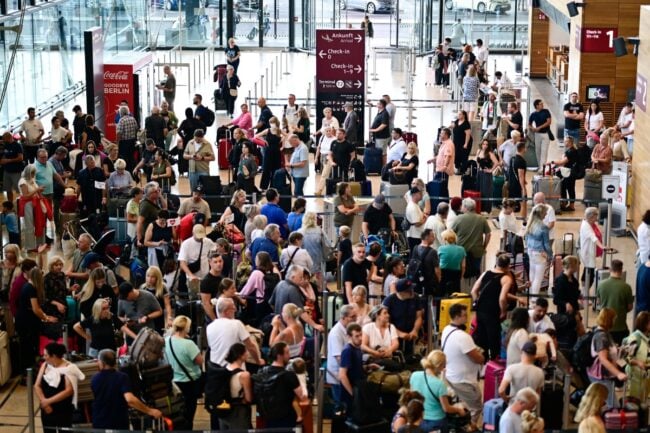More than 8,000 flights were delayed across the United States on Sunday as the shortage of air traffic controllers worsened amid the ongoing Federal Government shutdown, now in its 26th day. The situation has left millions of travelers stranded or facing long delays, adding pressure on lawmakers to end the budget standoff that has crippled several federal agencies since October 1.
According to U.S. Transportation Secretary Sean Duffy, the Federal Aviation Administration (FAA) experienced staffing shortages at 22 air traffic control locations on Saturday, one of the highest numbers recorded since the start of the shutdown. He warned that the disruptions could worsen if the funding impasse continues.
Data from flight-tracking website FlightAware showed that by 11 p.m. ET on Sunday (5 a.m. Nigerian time, Monday), more than 8,000 flights had been delayed, up from about 5,300 on Saturday. Delays have been consistently above average since the shutdown began, as critical aviation and transportation workers continue to operate without pay.
“This is one of the highest levels of strain the system has experienced since the shutdown began,” Duffy said during an appearance on Fox News’ Sunday Morning Futures. “That’s a sign that the controllers are wearing thin.”
Ground delay programs were issued by the FAA at major airports, including Chicago’s O’Hare International Airport, Washington’s Reagan National Airport, and Newark Liberty International Airport, due to staff shortages. Earlier on Sunday, a temporary ground stop was issued at Los Angeles International Airport but later lifted after partial staffing adjustments were made.
FlightAware’s data revealed that Southwest Airlines recorded the highest number of delays, with about 2,000 flights — nearly 45 per cent of its schedule — affected. American Airlines followed closely, with about 1,200 flights delayed, representing nearly one-third of its operations. United Airlines reported delays on 24 per cent of its flights (739 total), while Delta Air Lines recorded delays on about 610 flights, representing 17 per cent of its total.
The growing impact of these disruptions has further intensified public frustration with the shutdown, which has also left many federal workers unpaid. Roughly 13,000 air traffic controllers and about 50,000 Transportation Security Administration (TSA) officers have continued working without pay under federal emergency work regulations.
Industry observers say the mounting flight disruptions could soon pressure Congress and the White House to reach a budget deal, as the shutdown begins to hurt everyday Americans and the broader economy. Air travel plays a key role in business operations, tourism, and logistics, and prolonged delays could lead to revenue losses in the billions of dollars.
Transportation experts have warned that the FAA is already about 3,500 air traffic controllers short of its ideal staffing level, even before the shutdown. Many controllers had been working mandatory overtime and six-day weeks, raising concerns about fatigue and safety.
The Trump administration has also cautioned that flight disruptions are likely to increase as controllers miss their first full paycheck this week. While they received a partial paycheck two weeks ago covering work before the shutdown, Tuesday’s payday marks the first for work done entirely during the shutdown period.
Transportation Secretary Duffy revealed that some controllers are now seeking second jobs to make ends meet. “They’re taking second jobs, they’re out there looking,” he said, describing the financial strain on the nation’s aviation workforce.
Meanwhile, a U.S. judge on Monday upheld an earlier injunction blocking President Donald Trump’s proposed buyout plan for federal employees, complicating the administration’s efforts to manage staffing during the shutdown.
The ongoing standoff has not only affected air travel but also impacted key sectors like public safety, food inspection, and national parks, as federal employees remain unpaid. Lawmakers on both sides continue to exchange blame for the stalemate, but with the shutdown entering its fourth week, pressure is mounting for a resolution.
If the situation persists, analysts warn that further disruptions to air travel could ripple through the U.S. economy, slowing business operations and affecting consumer confidence. The longer the FAA and TSA remain under strain, the greater the risk to both aviation efficiency and public safety.
